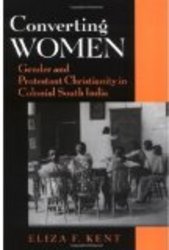Description
This book is about the conversion of women in colonial South India. It discusses how women converts sought to create a new, respectable community identity and how this identity was informed by both Western Christian discourse and elite Sanskritic customs and ideologies.
With the emergence of Hindu nationalism, the conversion of Indians to Christianity has become a volatile issue, erupting in violence against converts and missionaries. At the height of British colonialism, however, conversion was a path to upward mobility for low-castes and untouchables, especially in the Tamil-speaking south of India. In this book, Eliza F. Kent takes a fresh look at these conversions, focusing especially on the experience of women converts and the ways in which conversion transformed gender roles and expectations. Kent argues that the creation of a new, "respectable" community identity was central to the conversion process for the agricultural laborers and artisans who embraced Protestant Christianity under British rule. At the same time, she shows, this new identity was informed as much by elite Sanskritic customs and ideologies as by Western Christian discourse. Stigmatized by the dominant castes for their ritually polluting occupations and relaxed rules governing kinship and marriage, low-caste converts sought to validate their new higher-status identity in part by the reform of gender relations. These reforms affected ideals of femininity and masculinity in the areas of marriage, domesticity, and dress. By the creation of a "discourse of respectability," says Kent, Tamil Christians hoped to counter the cultural justifications for their social, economic, and sexual exploitation at the hands of high-caste landowners and village elites. Kent's focus on the interactions between Western women missionaries and the Indian Christian women not only adds depth to our understanding of colonial and patriarchal power dynamics, but to the intricacies of conversion itself. Posing an important challenge to normative notions of conversion as a privatized, individual moment in time, Kent's study takes into consideration the ways that public behavior, social status, and the transformation of everyday life inform religious conversion.
